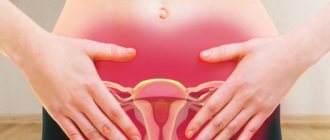The duration of the menstrual cycle should not exceed seven days, but should not be limited to three days. Disturbances can be observed during the initial formation of menstruation between the ages of twelve and sixteen years. Disruption of the monthly cycle may be a consequence of taking oral medications - contraceptives. If you are postpartum or after an abortion, your cycle may also be disrupted. Important indicators of menstruation failure are various diseases of the genital organs or exhaustion of the body. Most women have a regular cycle. If the end of menstrual bleeding occurs ahead of schedule, then it is noticed by the woman. It is imperative to figure out why your period ended earlier.
In fact, menstruation is maintained in a woman’s body at different levels: in the cerebral cortex and several other parts of the brain: the department responsible for the functioning of the endocrine system, hypothalamus, pituitary gland; in the uterus and ovaries. Disruption of the functioning of any of these organs, departments or systems will lead to various types of disruptions of the menstrual cycle.
Causes of premature ending of menstruation
The reason that your period ended earlier may be stress and high stress, especially nervous strain, psychological stress or physical stress, because it is under their influence that disruptions in the functioning of the central nervous system occur. These reasons for the premature end of menstruation can be considered if you did not use folk remedies to make your period end faster.
It is the central nervous system that regulates the appearance of spasms, dilation in the areas of blood vessels, and the activity of motor processes in the muscles of the uterus. This, in turn, can cause the uterine mucosa to resist new blood cells, which is the result of a malfunction.
How can diet affect menstruation?
In the modern world, a very common reason for menstruation to end early, leading to undesirable consequences, is constant adherence to extreme diets. The lack of nutrients in itself will affect the health of the entire body, but it will not bypass the process of blood renewal. Blood has the property of self-renewal, that is, it destroys old cells, replacing them with new ones. So, new cells may not receive enough of the necessary enzymes, which will lead to blood clotting disorders. There are softer ways to lose weight .
Colds can also lead to undesirable consequences, such as premature termination of menstruation, since they impair blood circulation. At the same time, menstruation is very painful, since the cause of this is the inflammatory process.
Hormonal imbalances also have a detrimental effect on changes in the menstrual cycle. Most often they occur in adolescence.
Etiology
The ovaries and pituitary gland are responsible for the formation of the menstrual cycle. When menstruation ends prematurely for no apparent reason, functional disorders can be suspected. If abortions, curettages have been performed repeatedly, or a woman has had tuberculosis, then physiological abnormalities may begin, such as inferiority of the endometrium of the uterus. They can provoke a decrease in the period of critical days. Poor blood circulation in the uterus and decreased hormone production also affect the formation of the menstrual cycle. All these deviations indirectly form the number of days in the cycle.
Oligomenorrhea can be caused directly by:
- sudden loss of body weight (fasting, dieting, anorexia);
- metabolic disorders, anemia and vitamin deficiency;
- nervous overstrain, mental illness;
- surgical intervention in the genitourinary system, injuries of the pelvic organs;
- pathology of the genital organs;
- lactation;
- hormonal contraceptives;
- diseases of the endocrine system;
- infectious diseases;
- intoxication.
What to do if there are disruptions in the menstrual cycle?
To understand why your period ended early and take some action, you need to consult a doctor, having first considered which of the above could lead to such consequences.
If the reason why your period ended earlier is hidden in high loads, stress or nutrition, then you need to change your lifestyle, thus:
- reduce the load,
- change diet,
- learn to cope with stress.
These actions will help get rid of the problem that caused your period to end earlier, but if this does not give results in the next three months, then you need to consult a doctor again to identify any painful situations. Timely prevention of the disease will not cause complications and will help the body recover as quickly as possible.
It is known that the normal duration of menstruation is at least three days. Within a week, menstrual flow ends. If your period starts and ends immediately, you can suspect various pathological conditions.
Can menstruation last 1 day?
The characteristics of women's cycles vary significantly. However, the average length of the menstrual cycle and the number of days on which periods begin and end have been established.
For most women, the cycle lasts 28 days (the norm is from 21 to 35 days). Menstrual flow has a volume of up to 100 ml and a duration of 3-7 days. Thus, menstruation normally does not start and ends immediately.
With various gynecological ailments, an increase or decrease in the total duration of the cycle and the amount of bleeding is observed. Gynecologists note that both heavy, long periods and quickly ending minor periods often indicate pathological conditions of a gynecological nature.
Sometimes women note that their periods lasted 1 day and immediately ended. This sign requires observation and consultation with a specialist. Abrupt cessation of menstruation can have serious reasons. In a small number of cases, periods begin and end quickly.
How to prevent this phenomenon?
When your period starts and immediately stops, this is an unusual situation.
To reduce such developments to a minimum, it is important to monitor your health throughout your life.
Experts unanimously say that any menstrual irregularities can be caused by bad habits, such as smoking and alcohol abuse.
Prevention of menstrual irregularities also includes taking care of your physical and emotional well-being. If possible, you should avoid stress and not engage in excessive physical activity. For timely diagnosis of problems of the reproductive system, you should regularly visit a gynecologist.
Possible reasons why your period ended prematurely
If menstruation begins and ends abruptly, it is necessary to establish the cause of the phenomenon. Don’t worry or get upset right away, since the cycle is influenced by a significant number of internal and external factors.
Physiological reasons
If your periods suddenly stop, you need to exclude the following physiological factors:
- Establishment of the cycle during puberty. The first menstruation does not indicate the complete completion of puberty, which begins long before menarche. It is known that ovulation begins only 1-2 years after the onset of menarche. If menstruation is anointed and stops during this time, they speak of a physiological norm.
- Menopause. If women's periods by the age of 45 last for one day and then they are missed, reproductive function may decline due to a decrease in the production of sex hormones. Associated symptoms include pressure changes, sweating and mood lability.
- Pregnancy. When menstruation appears a little and stops in women during the reproductive cycle, pregnancy can be suspected. Smearing during expected menstruation indicates implantation of the fertilized egg into the uterine cavity. To confirm or deny the fact of pregnancy, you should perform a rapid test.
Pathological causes
If your period lasted 1 day and ended immediately, it is necessary to exclude pathologies:
- Hormonal imbalance. Often, during menstruation, which lasted 1 day and ended immediately, a violation of the ratio of sex hormones is detected. Associated symptoms include pain in the lower abdomen, hirsutism, and changes in cycle length.
- Obesity. Adipose tissue has the ability to produce female sex steroids. Hormonal changes cause periods to begin and end quickly.
- Inflammatory processes. Infections and antibiotic use affect hormonal levels. This explains why menstruation lasted one day and ended.
- Ectopic pregnancy. If you have an active sexual life without contraception, you need to rule out an ectopic pregnancy if your period lasts for one day and then stops. The pathological course of pregnancy is also accompanied by pain radiating to the sacrum and anus.
Symptoms
Sometimes a woman does not notice any symptoms that could cause concern if her period started and ended immediately.
If the cycle and its duration are violated, the following may appear:
- migraine and headache;
- nausea and weakness;
- aching pain in the lower back and lower abdomen;
- disorders of stool and digestion;
- discomfort in the chest;
- regular nosebleeds;
- decreased sex drive.
The most common symptom of oligomenorrhea is when menstruation lasts for one day and then stops. Small-volume brown discharge can be caused by a different range of diseases and developmental disorders. Therefore, to treat menstrual irregularities, it will be necessary to establish the cause of this symptom.
Diagnostics
If menstruation begins and ends almost immediately within several cycles, it is advisable to conduct an examination. The list of diagnostic measures depends on the clinical picture, the patient’s medical history and age characteristics. Usually, the doctor immediately begins a gynecological examination, which allows you to determine the necessary types of laboratory and instrumental tests.
The examination often begins with the following diagnostic measures:
- smears for oncocytology, flora, sexually transmitted infections;
- colposcopy to detect cervical defects;
- ultrasound examination of organs in the pelvis;
- determination of the level of sex steroids, thyroid hormones;
- general blood and urine analysis.
This method allows you to immediately determine the presence of intra-abdominal bleeding.
Sometimes the examination ends with a consultation with other specialists, for example, an endocrinologist.
Content
For most girls, the cycle stabilizes approximately two years after the first discharge in adolescence.
Therefore, having your period ahead of time can frighten a woman and make her think about health problems. In fact, the reasons why menstruation begins prematurely may not be related to a disruption in the functioning of any of the body systems.
Menstruation is an important indicator of women's health, which refers to the process of removing an unfertilized egg from the uterus. Since every body is individual, all women have their own menstrual cycle. The time interval between the first and last days of the critical period varies from 25 to 35 days. Late or early periods indicate changes in a woman’s body.
Why do my periods come earlier?
Experts say the most common cause of premature menstruation is overwork, minor stress or nervous tension. The functioning of the nervous system can cause spasms and dilation of blood vessels. Because of this, the endometrium is rejected earlier. As a result, menstruation begins several days earlier than expected. It follows from this that, theoretically, even an ordinary quarrel with a husband, a cashier in a store, or under-salted soup provokes a cycle disruption.
A more serious reason why the monthly cycle begins prematurely is considered to be a hormonal imbalance. In this case, the woman needs to be examined and begin treatment. After all, if violations are not eliminated, they can lead to serious diseases, including infertility.
Prevention
When playing sports, you should not sharply increase the load or give preference only to strength exercises. If a woman notices increased emotionality and is subject to stress at home and at work, then she should think about consulting a psychologist, practicing yoga and meditation.
During this time, in addition to scanty discharge, an excessively long menstrual cycle or short periods may be observed.
This does not go away without a trace for the female body; disruptions are very often observed, including short periods. At the moment of menstruation.
The gaps between them can be quite long or short, but still noticeable. . Therefore, sometimes you should not be surprised that your periods are intermittent.
This is everything that happens from the first day of menstruation to the day preceding the next menstruation. . A shorter menstrual cycle also occurs.
If a woman stops using the pills abruptly, without finishing the pack, then she may not count the short periods after stopping the pill as menstruation.
Menstruation (from Latin mensis - month), menstruation or regula - part of the menstrual cycle. Oligomenorrhea, that is, excessively short menstruation.
Previously asked:
Hello, I wanted to ask you, I haven’t been able to get pregnant for 4 years now. And the last period lasted only 2 days. What does this mean? Am I pregnant?
Hello! If you are unable to get pregnant within two years, subject to regular sexual intercourse and lack of protection, a diagnosis of infertility is established. I would recommend that you do not put off going to a specialist, and together with your husband. Regarding atypical periods, it is very difficult to say whether there is a pregnancy or not. I recommend that you take a pregnancy test, or better yet, take a blood test for hCG. If the second line is at least weak or the hCG is above 20, you should see a doctor - this could be evidence of pregnancy. If you are experiencing pain during your scanty periods, you should immediately seek medical help. All the best!
Early periods: other reasons
Contraception. Menstruation often occurs a week earlier in women who have an intrauterine device installed or are taking hormonal contraceptives. To prevent this, do not miss taking your pills. After the package of contraceptives is finished, follow the break specified in the instructions (usually it is 7 days).
Pregnancy. Sometimes pregnant women experience “oddities” with their last period. A pregnant girl may find that her period ended earlier than usual and lasted 1-2 days. In addition, the discharge may have an uncharacteristic intensity, color, and may begin earlier than usual.
Climax. Before the onset of menopause, every woman experiences menopause. At this time, the menstrual cycle is disrupted, so you should not be surprised why your periods started earlier or stopped, but then started again.
Travel and relocation. Quite often, periods come earlier due to a change of place of residence or a trip to a different climate zone. This is associated with disruption of the autonomic nervous system, which affects blood vessels and internal reproductive organs.
Sexual infections. Due to promiscuous sexual intercourse, a woman can become infected with a sexually transmitted disease. Other unpleasant symptoms of the disease include early menstruation.
Abortion or miscarriage. After termination of pregnancy, a woman's body undergoes serious hormonal changes. Therefore, menstruation may begin earlier than expected or, on the contrary, go later. If the menstrual cycle has not returned after six months, the woman should consult a gynecologist.
Bad habits and unhealthy diet. The negative effects of unhealthy food, alcohol or cigarettes can disrupt your cycle and cause premature menstruation.
The most serious causes of premature menstruation include tumor, inflammation or injury. In 75% of women, a malignant tumor is found during menopause or menopause. Therefore, during this period, if menstruation began earlier and there is uncharacteristic discharge, the woman should consult a doctor. Especially if the discharge is accompanied by pain and general deterioration of the condition.
In addition, premature menstruation can occur due to hypoplasia of the genital organs, endometriosis, and glandular endometrial hyperplasia.
Treatment
Menstruation cannot occur one day per cycle during reproductive age without pathologies and disorders. Once the causes have been established, appropriate treatment is selected. If the diagnosis reveals disorders in nutrition, emotional health, or high physical activity and injuries, then all procedures will be aimed at correcting these factors. The doctor prescribes vitamins, antimicrobials and hormones.
Doctors are well aware of the accompanying phenomena of sexual diseases, so they can prescribe psychotherapy or send you to physical therapy in order to eliminate all functional disorders. Indications for such treatment would be constant headaches, prolonged depression, weakness and apathy.
Women often ask the question: “my period was only 2 days, what does this mean?” If, when collecting an anamnesis, symptoms of menopausal syndrome and the lactation period are excluded, then special treatment is not prescribed. It is a mistake to restore the menstrual cycle with synthetic hormones. The degree of side effects exceeds the predicted benefits of such drugs. Even if a woman has long noticed that her menstruation lasts 1 day, the reasons for this phenomenon may be different. In order not to cause harm to the body, you should choose only natural medicines with herbal extracts. The complex effect of phytohormonal preparations not only normalizes the menstrual cycle, but also removes PMS symptoms, improves mood, performance and improves well-being.
Periods ahead of time: what to do?
We figured out whether menstruation can come earlier. But what should a woman do to prevent cycle disruption? First, you should think about your lifestyle. Most women can find and prevent the causes on their own. You just need to free yourself from excessive workload at work, stop quarreling with your family, introduce more healthy home-cooked food into your diet, giving up fast food. If you take hormonal medications, most likely, it is because of them that your period began earlier. Your periods will return quickly if you are careful about taking your birth control pills. If your period starts a day earlier, then you don’t have to worry, because this is not considered a cycle failure.
If premature menstruation has become the norm, you should quickly make an appointment with a gynecologist and undergo an examination. The specialist will answer all your questions, tell you how to get your period earlier or later, and prescribe tests and treatment.
The most important and interesting news about infertility treatment and IVF is now in our Telegram channel @probirka_forum Join us!










